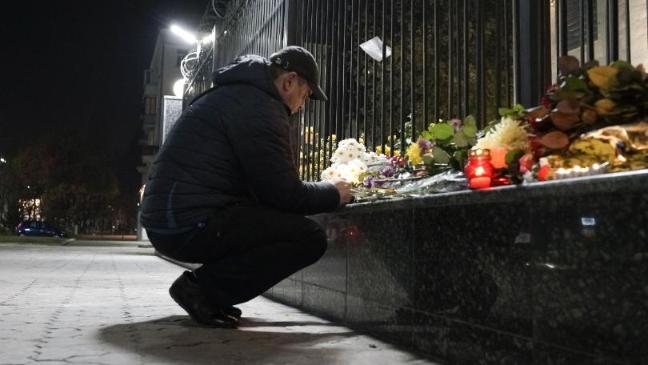
Investigators are working to discover what caused a Russian passenger
airliner to crash in Egypt's Sinai Peninsula killing all 224 people on
board.
The Airbus-A321-200 crashed in a remote mountainous area 23 minutes after taking off from a popular Red Sea resort.
Two major European airlines announced they would stop flying over the area for safety reasons after a local affiliate of the extremist Islamic State (IS) group claimed it "brought down" the aircraft.
Russia's transport minister dismissed that claim as not credible.
Almost everyone on board the plane operated by the Moscow-based Metrojet airline was Russian, and 25 children died. Ukraine said four of its citizens were passengers. There were seven crew members.
Egypt's civil aviation ministry said the plane's wreckage was found in the Hassana area some 44 miles south of the city of el-Arish.
It is in an area of northern Sinai where Egyptian security forces have for years fought local Islamic militants who in recent months claimed allegiance to IS.
The ministry said the plane took off from the resort city of Sharm el-Sheikh shortly before 6am local time for St Petersburg in Russia and disappeared from radar screens 23 minutes after take-off.
Egyptian prime minister Sherif Ismail toured the crash site and later told a Cairo news conference that 129 bodies had been recovered.
Photos from the site released by his office showed the badly damaged sky blue tail of the aircraft, with the Metrojet logo still visible. In the background, heaps of smouldering debris dotted the barren terrain.
One photo showed a member of the search team holding the flight recorder, or black box, which Mr Ismail said would be scrutinised as investigators try to discover what caused the crash.
Russian investigators were expected to arrive in Egypt today.
Natalya Trukhacheva, identified as the wife of co-pilot Sergei Trukachev, told Russian state-controlled NTV that her husband had complained about the plane's condition.
She said a daughter "called him up before he flew out - he complained before the flight that the technical condition of the aircraft left much to be desired".
One Egyptian official, Ayman al-Muqadem of the government's Aviation Incidents Committee, said before the plane lost contact with air traffic controllers, the pilot had radioed and said the aircraft was experiencing technical problems and that he intended to try and land at the nearest airport.
Metrojet said the A321-200 aircraft was in good shape and that the pilot was experienced. It identified the captain as Valery Nemov and said he had 12,000 hours of flying experience, including 3,860 in A321s.
http://home.bt.com/news/world-news/experts-search-for-cause-of-russian-plane-crash-in-egypt-11364014015083
The Airbus-A321-200 crashed in a remote mountainous area 23 minutes after taking off from a popular Red Sea resort.
Two major European airlines announced they would stop flying over the area for safety reasons after a local affiliate of the extremist Islamic State (IS) group claimed it "brought down" the aircraft.
Russia's transport minister dismissed that claim as not credible.
Almost everyone on board the plane operated by the Moscow-based Metrojet airline was Russian, and 25 children died. Ukraine said four of its citizens were passengers. There were seven crew members.
Egypt's civil aviation ministry said the plane's wreckage was found in the Hassana area some 44 miles south of the city of el-Arish.
It is in an area of northern Sinai where Egyptian security forces have for years fought local Islamic militants who in recent months claimed allegiance to IS.
The ministry said the plane took off from the resort city of Sharm el-Sheikh shortly before 6am local time for St Petersburg in Russia and disappeared from radar screens 23 minutes after take-off.
Egyptian prime minister Sherif Ismail toured the crash site and later told a Cairo news conference that 129 bodies had been recovered.
Photos from the site released by his office showed the badly damaged sky blue tail of the aircraft, with the Metrojet logo still visible. In the background, heaps of smouldering debris dotted the barren terrain.
One photo showed a member of the search team holding the flight recorder, or black box, which Mr Ismail said would be scrutinised as investigators try to discover what caused the crash.
Russian investigators were expected to arrive in Egypt today.
Natalya Trukhacheva, identified as the wife of co-pilot Sergei Trukachev, told Russian state-controlled NTV that her husband had complained about the plane's condition.
She said a daughter "called him up before he flew out - he complained before the flight that the technical condition of the aircraft left much to be desired".
One Egyptian official, Ayman al-Muqadem of the government's Aviation Incidents Committee, said before the plane lost contact with air traffic controllers, the pilot had radioed and said the aircraft was experiencing technical problems and that he intended to try and land at the nearest airport.
Metrojet said the A321-200 aircraft was in good shape and that the pilot was experienced. It identified the captain as Valery Nemov and said he had 12,000 hours of flying experience, including 3,860 in A321s.
http://home.bt.com/news/world-news/experts-search-for-cause-of-russian-plane-crash-in-egypt-11364014015083

No comments:
Post a Comment